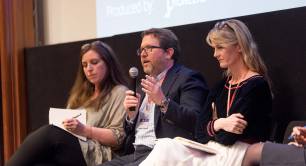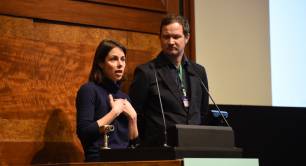The barriers to getting good deals done
A number of newcomers to the world of social enterprise were invited to join the Good Deals + Beyond Good Business conference in March. One of them was struck by social entrepreneurs’ infectious drive to change the world for the better, but realised that there are many obstacles to the movement’s growth.
A Newcomer's Reflections on the Good Deals/Beyond Good Business Conference 2018
As a newcomer to the world of social enterprise, I arrived at the Good Deals + Beyond Good Business conference 2018 full of curiosity and excitement to learn more about how this increasingly important business model addresses the growing problems society faces in today's ever-changing world.
Ultimately, I discovered that social enterprises face many obstacles in obtaining investment and funding. However, the key take-home message for me from the event was the need for closer relationships between the businesses, investors and governments in this field in order to maximise impact and foster sustainability. As Indy Johar of Dark Matter Laboratories so beautifully summarised in a heartfelt Q&A session, "we need to change the dialogue of what it means to be human and argue for a different structural world."
After receiving a warm welcome, the event dived straight into the opening speeches of Tim West of The Fable Bureau and Dirk Bischof of Hatch. They provided a fascinating snapshot of how the landscape has changed for social enterprises in the past 10 years.
Although I do not work in the field, I have witnessed the rise of social enterprises in many products on our supermarket shelves as well as noting the increasing number of corporates seeking to deliver social responsibility. Therefore, it did not surprise me to learn that the number of social enterprises in the UK has increased from around 15,000 in 2005, contributing £18bn to the UK economy, to 99,000-180,000, now contributing between £24bn and £55bn to the UK economy and employing 1m to 2m people. An inspiring increase in potential impact.
However, I was truly shocked by the bafflingly low number of investment deals done for social enterprises, taking 2016 as the example, with only 0.3% of ventures deemed “ready” for social investment. This contrasted sharply with the 300% growth in social investment between 2012 and 2016. On top of this was the astonishing fact that there is an available £400m in funds set aside by the UK government for social enterprises that remains unallocated. As West and Bischof emphasised, it was therefore clear that there is much work to be done in improving access to and granting of social investment for these vital businesses to gain traction.
What should social investors do to help?
The first plenary session I attended was entitled 'How creativity can change the world' and was delivered with passion by Kresse Wessling of Elvis & Kresse, a social enterprise producing luxury goods from waste products and fire hoses.
“Do more, be better” was one of the missions of Kresse's company and an ethos by which she believed all social enterprises need to operate. I realised from this, that as the world faces more impactful social problems, the social enterprises need to ensure they grow alongside these issues.
Whilst Kresse was encouraged by the increased funding that is now available to social enterprises that was simply not there 10 years ago, she made an impassioned plea to investors to not just give money. Instead, her refreshing call was for investors to “roll up their sleeves” and actively engage with scaling these businesses. It was becoming clear to me, even as a newcomer, that those in social investment need to take a fresh look at how they operate.
It was becoming clear to me, even as a newcomer, that those in social investment need to take a fresh look at how they operate
When asked how a social enterprise should now be defined, Kresse's response that the sector should allow for different business models to tackle different problems was, for me, on the money. In other words, it is not a case of “one size fits all”. Provided the social values are embedded in the business model, it can be a social enterprise.
The need for more joined-up thinking
This session left me buzzing but wanting to find out more about why there were so many challenges faced by social enterprises in seeking investors. The Q&A session with an esteemed panel which included Baroness Glenys Thornton of the House of Lords and Indy Johar, co-founder of Dark Matter Laboratories, was an eye-opener for me.
All of the speakers recognised the increasing need for social enterprises to be more visible. However, what resonated for me from all corners was that in order to have greater impact and sustainability, the sector must build much closer ties and ensure there is joined up thinking between the businesses, investors and governments around the world.
By the end of the day, the common thread running through the whole event that had struck me on observing and hearing the many attendees interact was the ever-present passion and drive to make a positive impact on the world through doing business. This quality shone through in everyone without exception. It was infectious.
Society needs more people like this, driven by purpose and not profit, to stand up and strive to change the world
Society needs more people like this, driven by purpose and not profit, to stand up and strive to change the world. We can do this step by step and lead the next generation to do the same, getting investors and governments fully on-side.
After all, as Amit Bhatia, CEO of the Global Steering Group for Impact Investment, put it, "the world is one family."
The author of this article is currently working in the private sector and attended Good Deals + Beyond Good Business to explore the social enterprise world.
Good Deals + Beyond Good Business was delivered by Pioneers Post and Hatch and took place in London on 13 March 2018 #GDBGB



